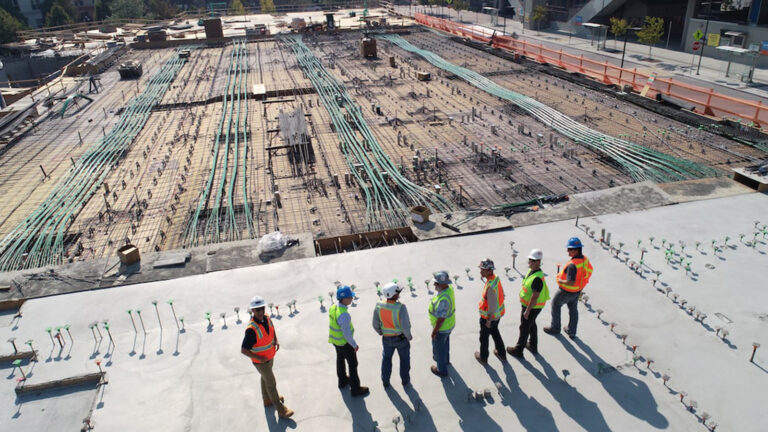I. Introduction
When we marvel at the skyline of a bustling city or the grandeur of a well-engineered bridge, seldom do we stop to acknowledge the tremendous journey that lies beneath these wonders of human achievement. Unseen by the naked eye is an intricate world of concrete shoring engineering, a marvel in itself that transforms conceptual blueprints into towering figures of reality. This article hopes to offer you a fascinating insight into the evolution of concrete shoring engineering, thereby underlining its enduring importance in the modern construction industry.
II. A Peek Into Hanthel Consulting
At the heart of this vast industry sits Hanthel Consulting, a forward-thinking construction and structural consulting firm driven by its commitment to excellence, innovation, and delivering the best for its clientele. Led by a seasoned Senior Project Manager and Civil Engineer, the firm is a beacon of leadership in the industry, embodying trust, professionalism, and sterling quality.
Hanthel Consulting truly reflects the principles of its leader, who stands atop a decade-long experience in managing large commercial construction projects. Registered as a Civil Engineer in multiple states including California, Nevada, Texas, and Massachusetts, the leader of Hanthel Consulting is credited with significant contributions to the industry, leveraging technology in construction, and constantly elevating industry standards on a national scale.
The services offered by Hanthel Consulting span Construction Engineering Services, Building and Remodeling Services, Structure Observation and Report, along with Specialized Services. Each facet of their service exhibits their proficiency in managing all aspects of construction and structural consulting, articulating their commitment to exceed expectations and deliver outstanding results.
III. The Birth and Ancient Roots of Concrete Shoring Engineering
Now, to truly understand concrete shoring engineering, we must venture into its rudimentary origins. Tracing its roots back to 200 years ago with the formation of the Institution of Civil Engineers in London, the field revolved around traditional cornerstone elements like roads, bridges, aqueducts, canals, river navigation, and docks.
Even in ancient times, the inevitability of cement in concrete is undeniable. Cement traces back to twelve million years ago, but it wasn’t until 300 BC that the Romans utilized slaked lime and volcanic ash known as pozzolana to create a substance bearing remarkable similarity to modern-day cement. These cementitious materials formed the basis of exceptional structures like the Pantheon’s dome in Rome, which still stands proudly as the world’s largest unreinforced concrete dome.
IV. The Surge in Post-Tensioning Techniques in Concrete Shoring
Looking at the modern facets of engineering, the application of post-tensioning in structures didn’t commence until around the 1860s. It was through the contribution of inventors like R E Dill and Eugene Freyssinet that techniques such as lift slab construction truly became commonplace. The fervent growth in using post-tensioning was further stimulated by technological advances like user-friendly software for design and universal structural modeling techniques developed in the early 2000s.
V. The Journey from Crude Cements to Modern Concrete
In the journey of concrete evolution, a critical moment was the discovery around 1300 BC that burned limestone formed a hard protective surface upon chemical reaction with gases in the air, marking the advent of cement. Today’s concrete hails from this rudimentary cement, with further enhancements comprising coarse and fine aggregates of stone and sand, water, and admixtures for various environmental conditions.
Historical milestones imprint the chronological journey of concrete, marking its evolution across civilizations in Egypt, China, Rome, and the Middle East. The air entrainment technique and thin-shell techniques laid the foundation for iconic architectural structures like the Sydney Opera House, highlighting the continual evolution of concrete shoring engineering.

VI. The Shift to Modern High-Rise Buildings
Advancements in the recent century spotlight the shift towards high-rise buildings constructed from high-strength concrete. Beginning from the conception of the first concrete skyscraper in 1904, the 20th century observed the growing likeness for reinforced concrete, delivering visually striking and architecturally innovative structures. The trend for high-strength concretes has progressed with the advent of fly ash, opening avenues for towering edifices.
VII. How Hanthel Consulting Navigates the Evolution of Concrete Shoring Engineering
Hanthel Consulting understands and appreciates the transformative journey of concrete shoring engineering. By adhering to the historical successes and advancements of the field, the firm incorporates the latest techniques and technologies into its strategies. This blend of past wisdom and present innovation allows Hanthel Consulting to navigate the path of concrete shoring engineering successfully, ensuring the best output for their clients.
VIII. Conclusion
As we reach the end of our brief tour into the fascinating journey of concrete shoring engineering, it is plain to see that the field is the cornerstone of our built environment. The continual evolution of the field has not only shaped skylines across the globe but also revolutionized the very way we perceive our surroundings. At the center of this change is Hanthel Consulting, steadfastly navigating this transforming landscape with a commitment to quality, professionalism, and trust. The journey of concrete shoring engineering continues, and with it, the unwavering ethos and dedication of Hanthel Consulting.



